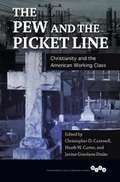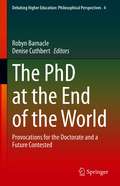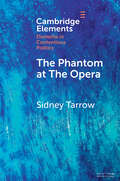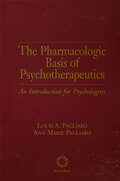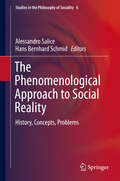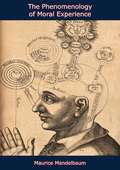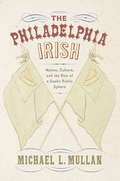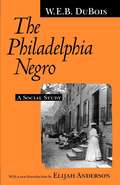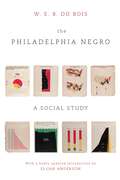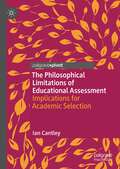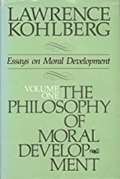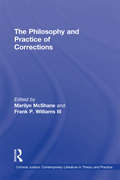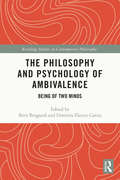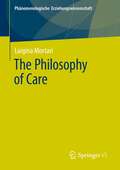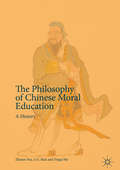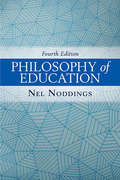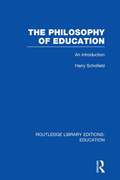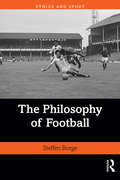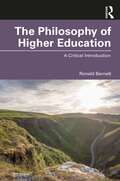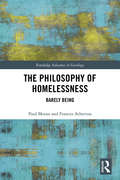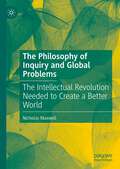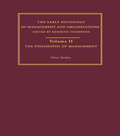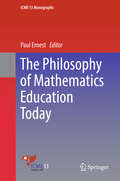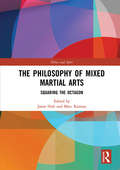- Table View
- List View
The Pew and the Picket Line: Christianity and the American Working Class
by Christopher D. Cantwell Janine Giordano Drake Heath W. CarterThe Pew and the Picket Line collects works from a new generation of scholars working at the nexus where religious history and working-class history converge. Focusing on Christianity and its unique purchase in America, the contributors use in-depth local histories to illustrate how Americans male and female, rural and urban, and from a range of ethnic backgrounds dwelt in a space between the church and the shop floor. Their vivid essays show Pentecostal miners preaching prosperity while seeking miracles in the depths of the earth, while aboveground black sharecroppers and white Protestants establish credit unions to pursue a joint vision of cooperative capitalism. Innovative and essential, The Pew and the Picket Line reframes venerable debates as it maps the dynamic contours of a landscape sculpted by the powerful forces of Christianity and capitalism. Contributors: Christopher D. Cantwell, Heath W. Carter, Janine Giordano Drake, Ken Fones-Wolf, Erik Gellman, Alison Collis Greene, Brett Hendrickson, Dan McKanan, Matthew Pehl, Kerry L. Pimblott, Jarod Roll, Evelyn Sterne, and Arlene Sanchez Walsh.
The PhD at the End of the World: Provocations for the Doctorate and a Future Contested (Debating Higher Education: Philosophical Perspectives #4)
by Denise Cuthbert Robyn BarnacleThis book addresses a world-wide audience with reference to a global problem: how the PhD can serve the planet. It examines the role of the PhD, in and of itself, and, as representative of research, the university and evidence-based knowledge, in relation to global crisis and the future of humanity. As such, it speaks to the scholar, the teacher, the policy-maker and the administrator concerned with the role of higher education’s highest award at a time of great global crisis. The approach is critical in that it offers diverse views on these issues and does not seek to privilege one single school of thought. The collected articles span theoretical reflections on key issues through to case-study examples of how PhDs are being deployed and re-thought to address global issues.
The Phantom at The Opera: Social Movements and Institutional Politics (Elements in Contentious Politics)
by Sidney TarrowMovements and parties have given rise to two largely separates specialties in the social sciences. This Element is an effort to link the two literatures, using evidence from American political development. It identifies five relational mechanisms governing movement/party relations: two of them short term, two intermediate term, and one long-term. It closes with a reflection on the role of movement/party relations in democratization and for democratic resilience.
The Pharmacologic Basis of Psychotherapeutics: An Introduction For Psychologists
by Louis A. Pagliaro Ann M. PagliaroFirst published in 1998. Routledge is an imprint of Taylor & Francis, an informa company.
The Phenomenological Approach to Social Reality: History, Concepts, Problems (Studies in the Philosophy of Sociality #6)
by Hans Bernhard Schmid Alessandro SaliceThis volume features fourteen essays that examine the works of key figures within the phenomenological movement in a clear and accessible way. It presents the fertile, groundbreaking, and unique aspects of phenomenological theorizing against the background of contemporary debate about social ontology and collective intentionality.The expert contributors explore the insights of such thinkers as Martin Heidegger, Edmund Husserl, Adolf Reinach, and Max Scheler. Readers will also learn about other sources that, although almost wholly neglected by historians of philosophy, testify to the vitality of the phenomenological tradition. In addition, the contributions highlight the systematic relevance of phenomenological research by pinpointing its position on social ontology and collective intentionality within the history of philosophy.By presenting phenomenological contributions in a scholarly yet accessible way, this volume introduces an interesting and important perspective into contemporary debate insofar as it bridges the gap between the analytical and the continental traditions in social philosophy. The volume provides readers with a deep understanding into such questions as: What does it mean to share experiences with others? What does it mean to share emotions with friends or to share intentions with partners in a joint endeavor? What are groups? What are institutional facts like money, universities, and cocktail parties? What are values and what role do values play in social reality?
The Phenomenology of Moral Experience
by Maurice MandelbaumDuring the past few decades most philosophers have approached ethical theory through logical and epistemological analyses. Others have attempted to derive ethical theory from interpretations of psychological or sociological facts. Professor Mandelbaum shows the necessity for grounding any ethical theory upon the phenomenological analysis of moral experience. In analyzing the structure of that experience and the types of judgment to which it gives rise, Professor Mandelbaum takes as his point of departure the claims of three different traditions: British moral philosophy from the eighteenth century through the first third of the present century; the phenomenological movement in Germany; and the naturalistic, psychologically oriented theories of value which on the whole were characteristic of American philosophy in the first half of this century.In six essays the author probes the most significant features of various types of moral experience and describes those features that all possess in common. His conclusions tend to support those who have attacked the utilitarian tradition.“This is an important and valuable book; neither startlingly revolutionary nor disturbingly profound, its merits are of a more modest kind. Professor Mandelbaum discusses some well-worn themes, but he has an eye for the essential and he illuminates some important areas in moral philosophy that have recently been left obscure.”—Philosophy
The Philadelphia Irish: Nation, Culture, and the Rise of a Gaelic Public Sphere
by Michael L. MullanThis book describes the flowering of the Irish American community and the 1890s growth of a Gaelic public sphere in Philadelphia, a movement inspired by the cultural awakening in native Ireland, transplanted and acted upon in Philadelphia’s robust Irish community. The Philadelphia Irish embraced this export of cultural nationalism, reveled in Gaelic symbols, and endorsed the Gaelic language, political nationalism, Celtic paramilitarism, Gaelic sport, and a broad ethnic culture. Using Jurgen Habermas’s concept of a public sphere, the author reveals how the Irish constructed a plebian “counter” public of Gaelic meaning through various mechanisms of communication, the ethnic press, the meeting rooms of Irish societies, the consumption of circulating pamphlets, oratory, songs, ballads, poems, and conversation. Settled in working class neighborhoods of vast spatial separation in an industrial city, the Irish resisted a parochialism identified with neighborhood and instead extended themselves to construct a vibrant, culturally engaged network of Irish rebirth in Philadelphia, a public of Gaelic meaning.
The Philadelphia Negro
by Elijah Anderson W. E. B. Du Bois<P>In 1897 the promising young sociologist William Edward Burghardt Du Bois (1868-1963) was given a temporary post as Assistant in Sociology at the University of Pennsylvania in order to conduct in-depth studies of the Negro community in Philadelphia. <P>The product of those studies was the first great empirical book on the Negro in American society. <P>More than one hundred years after its original publication by the University of Pennsylvania Press, The Philadelphia Negro remains a classic work. <P>It is the first, and perhaps still the finest, example of engaged sociological scholarship--the kind of work that, in contemplating social reality, helps to change it. <P>In his introduction, Elijah Anderson examines how the neighborhood studied by Du Bois has changed over the years and compares the status of blacks today with their status when the book was initially published.
The Philadelphia Negro: A Social Study
by W. E. Du BoisIn 1897 the promising young sociologist William Edward Burghardt Du Bois (1868–1963) was given a temporary post as Assistant in Sociology at the University of Pennsylvania in order to conduct a systematic investigation of social conditions in the seventh ward of Philadelphia. The product of those studies was the first great empirical book on the Negro in American society.More than one hundred years after its original publication by the University of Pennsylvania Press, The Philadelphia Negro remains a classic work. It is the first, and perhaps still the finest, example of engaged sociological scholarship—the kind of work that, in contemplating social reality, helps to change it.In his introduction, Elijah Anderson examines how the neighborhood studied by Du Bois has changed over the years and compares the status of blacks today with their status when the book was initially published.
The Philippines: Mobilities, Identities, Globalization
by James A. TynerNearly five million migrant workers from the Philippines are employed in over 190 countries and territories. They work as doctors and domestic helpers, engineers and entertainers, seamstresses and surveyors. It is through their collective labor that the Philippines has assumed a global presence. For over five centuries the Philippines has been integrated into the world economy. Only recently, however, has the Philippines been a pro-active agent in the production of a global economy. Since the 1970s the Philippine state, in connection with myriad private institutions, has recruited, trained, marketed, and deployed a mobile work-force. Annually, approximately one million migrant workers travel to all corners of the world. The Philippines seeks to understand how the Philippines has become the world’s largest exporter of government-sponsored temporary contract labor and, in the process, has dramatically reshaped both the processes of globalization and also our understanding of globalization as concept.
The Philosophical Limitations of Educational Assessment: Implications for Academic Selection
by Ian CantleyThis book uses philosophical analysis to argue that there are tensions associated with using results of high stakes tests to predict students’ future potential. The implications of these issues for the interpretation of test scores in general are then elucidated before their connotations for academic selection are considered. After a brief overview of the history of academic selection in the United Kingdom, and a review of evidence pertaining to its consequences, it is argued that the practice of using the results of contemporary high stakes tests to make important decisions about students incurs logical and moral problems that a conscientious educator cannot ignore. The gravity of the moral transgression depends on the purpose and significance of the test and, in the case of high stakes tests used for academic selection purposes, it is argued that, not only can the moral wrong be highly significant, but better solutions are within reach.
The Philosophy Of Moral Development: Essays In Moral Development
by Lawrence KohlbergExamines the theories of Socrates, Kant, Dewey, Piaget, and others to explore the implications of Socrates' question "what is a virtuous man, and what is a virtuous school and society which educates virtuous men."
The Philosophy and Practice of Corrections (Criminal Justice: Contemporary Literature in Theory and Practice #4)
by Frank P. Williams III Marilyn McShanePublished in 1997, The Philosophy and Practice of Corrections is a valuable contribution to the field of Sociology & Social Policy.
The Philosophy and Psychology of Ambivalence: Being of Two Minds (Routledge Studies in Contemporary Philosophy)
by Berit Brogaard Dimitria Electra GatziaThis book collects original essays by top scholars that address questions about the nature, origins, and effects of ambivalence. While the nature of agency has received an enormous amount of attention, relatively little has been written about ambivalence or how it relates to topics such as agency, rationality, justification, knowledge, autonomy, self-governance, well-being, social cognition, and various other topics. Ambivalence presents unique questions related to many major philosophical debates. For example, it relates to debates about virtues, rationality, and decision-making, agency or authenticity, emotions, and social or political metacognition. It is also relevant to a variety of larger debates in philosophy and psychology, including nature vs. nature, objectivity vs. subjectivity, or nomothetic vs. idiographic. The essays in this book offer novel and wide-ranging perspectives on this emerging philosophical topic. They will be of interest to researchers and advanced students working in ethics, epistemology, philosophy of mind, philosophy of psychology, and social cognition.
The Philosophy of Care (Phänomenologische Erziehungswissenschaft #11)
by Luigina MortariCare is the most important thing for life, since to model life we need to care for ourselves, for the others, and for the human institutions. Care is the most important ontological phenomenon because we are what we care for. It is essential to care for life in order to maintain it along time, to make it flourish and to repair the wounds of being-there.This book develops a philosophy of care not only by considering the contemporary literature, but above all by basing the argumentations on the ancient Greek philosophy. Moreover, the argumentations are grounded in a phenomenological analysis of the experience of care.
The Philosophy of Chinese Moral Education: A History
by A. G. Rud Zhuran You Yingzi HuThe book depicts a unique historical and cultural phenomenon, the philosophy of Chinese moral education, in an attempt to capture the essence of Chinese culture. While tracing the historical journey of this philosophy, the book rearranges and interprets the conceptual frameworks concerning moral education in various Chinese philosophical schools and religions. In so doing, it summarizes the ideas of human relations, man and nature, cosmology, moral virtues, and educational approaches, posing intriguing questions about how they have influenced Chinese characteristics, social norms, and value orientations. In particular, the book brings up discussions on the culture of family and state, the challenges that the philosophy had encountered in early modern and present China, as well as the prospect of regeneration of the philosophy and its significance for our world today. This is the book to read if you want to have a deep understanding about China and its belief and educational system.
The Philosophy of Education
by NoddingsThe first edition of Nel Noddings’ Philosophy of Education was acclaimed as the "best overview in the field” by the journal Teaching Philosophy and predicted to "become the standard textbook in philosophy of education” by Educational Theory. This classic text, originally designed to give the education student a comprehensive look at philosophical thought in relation to teaching, learning, research, and educational policy, has now been updated to reflect the most current thinking in the field. A revised chapter on Logic and Critical Thinking makes the topic more accessible to students and examines how critical thinking plays a role in light of the new Common Core standards. Philosophy of Education introduces students to the evolution of educational thought, from the founding fathers to contemporary theorists, with consideration of both analytic and continental traditions. This is an essential text not only for teachers and future teachers, but also for anyone needing a survey of contemporary trends in philosophy of education.
The Philosophy of Education: An Introduction (Routledge Library Editions: Education)
by Harry SchofieldThere are many students who find philosophy of education difficult, because they have never received teaching in the basic essentials of general philosophy. This book begins by asking the basic question ‘what is philosophy?’ and examines a number of possible answers. Step by step the reader is introduced to the modern techniques of linguistic and concept analysis. Whenever a technical term is used it is explained and illustrated by reference to familiar situations in everyday life.
The Philosophy of Football (Ethics and Sport)
by Steffen BorgeHuman beings are the only creatures known to engage in sport. We are sporting animals, and our favourite pastime of football is the biggest sport spectacle on earth. The Philosophy of Football presents the first sustained, in-depth philosophical investigation of the phenomenon of football. In explaining the complex nature of football, the book draws on literature in sociology, history, psychology and beyond, offering real-life examples of footballing actions alongside illuminating thought experiments. The book is organized around four main themes considering the character, nature, analysis and aesthetics of football. It discusses football as an extra-ordinary, unnecessary, rule-based, competitive, skill-based physical activity, articulated as a social (as opposed to natural) kind that is fictional in character, and where fairness or fair play – contrary to much sport ethical discussion – is not centre stage. Football, it is argued, is a constructive- destructive contact sport and, in comparison to other sports, is lower scoring and more affected by chance. The latter presents to its spectators a more unpredictable game and a darker, more complex and denser drama to enjoy. The Philosophy of Football deepens our understanding of the familiar features of the game, offering novel interpretations on what football is, how and why we play it, and what the game offers its followers that makes us so eagerly await match day. This is essential reading for anybody with an interest in the world’s most popular game or in the philosophical or social study of sport.
The Philosophy of Higher Education: A Critical Introduction
by Ronald BarnettProviding a comprehensive introduction to the philosophy of higher education this book steps nimbly through the field, leading it into new areas and advancing an imaginative ecological realism. Each chapter takes the form of a short essay, tackling a particular topic such as values, knowledge, teaching, critical thinking and social justice. It also examines key issues including academic freedom, the digital university and the Anthropocene, and draws on classic as well as contemporary texts in the field. Composed of five parts, the book travels on a compelling journey: Part one identifies foundations of the field, distinguishing between the ideas of university and higher education, Part two examines key concepts, including research, culture, academic freedom and reason, Part three focuses on higher education as a set of educational practices and being a student, Part four is concerned with the university as an institution and includes the matters of leadership and the spirit of the university, Part five turns to the university in the world, and argues for an ecological perspective. Written in a lively and accessible style, and ideal for anyone coming to the field for the first time but also of interest to experienced scholars, this book offers sightings of new possibilities for higher education and the university.
The Philosophy of Homelessness: Barely Being (Routledge Advances in Sociology)
by Paul Moran Frances AthertonThe Philosophy of Homelessness is borne out of a five-year ethnographic research project involving being with a group of chronically homeless people in Chester. A small city located in the northwest of the UK, Chester is economically supported by its heritage and the tourism that this attracts. In an obvious sense, the awkwardness of the phrase ‘being with a group of chronically homeless people’ is regrettable. Nevertheless, this unfortunately self-conscious phrase is significant, with its importance residing in the word and concept of ‘being’. Whilst philosophical understandings of being are often thought about in rather abstract terms, The Philosophy of Homelessness explores the daily experience of chronic homelessness from a perspective that renders its ontological impress in ways that are explicitly felt, often in forms that are overtly political and exclusionary in character, especially in terms of identity and belonging within the city. Themes that emerge from the work, which coalesce around living in the margins of the city and experiencing only the shadow of the right to be, include: the economy of chronic addiction and its impact upon the body; the relationship between chronic homelessness and the law; and chronic homelessness and identity and desire. These themes are explored through a number of thinkers, though predominantly: Nietzsche, Lacan, Bourdieu and Kristeva. This work is likely to be of interest to anyone working in the fields of: criminology; sociology, especially those areas concerned with marginalised groups; and philosophy in its socially and politically engaged forms; as well as to those with an interest in homelessness.
The Philosophy of Inquiry and Global Problems: The Intellectual Revolution Needed to Create a Better World
by Nicholas MaxwellUniversities have long been dominated by a philosophy of inquiry that may be called knowledge-inquiry. This holds that, in order to do justice to the basic humanitarian aim of helping to promote human welfare, academic inquiry must, in the first instance, seek knowledge and technological know-how. First, knowledge is to be acquired; once acquired, it can be applied to help promote human welfare. But this philosophy of knowledge-inquiry is an intellectual and humanitarian disaster. It violates three of the four most elementary rules of rational problem solving conceivable, and as a result fails to give priority to the task of helping humanity resolve those conflicts and problems of living, such as the climate and nature crises, that need to be resolved if we are to make progress to a better world – a world in which there is peace, democracy, justice, liberty, and sustainable prosperity, for all. Very few academics today are aware of this rationality scandal. We urgently need to bring about a revolution in universities around the world, wherever possible, so that academic inquiry puts all four rules of rational problem solving into practice, and becomes rationally devoted to helping humanity learn how to make progress towards a better world. Knowledge-inquiry needs to become wisdom-inquiry, rationally devoted to helping humanity create a wiser world.
The Philosophy of Management (History Of Management Thought And Practice Ser.)
by Oliver SheldonTaylorism was criticised for its over-simplistic view of what motivated the worker. Oliver Sheldon's theme was that though Taylorism had helped the development of a science of management, such work should not detract from the predominantly human job of the manager to manage. His work prefigures the human relations approach to management theory of Elton Mayo and F. J. Roethlisberger in rejecting the notion that economic incentives largely explain employee behaviour.
The Philosophy of Mathematics Education Today (ICME-13 Monographs)
by Paul ErnestThis book offers an up-to-date overview of the research on philosophy of mathematics education, one of the most important and relevant areas of theory. The contributions analyse, question, challenge, and critique the claims of mathematics education practice, policy, theory and research, offering ways forward for new and better solutions. The book poses basic questions, including: What are our aims of teaching and learning mathematics? What is mathematics anyway? How is mathematics related to society in the 21st century? How do students learn mathematics? What have we learnt about mathematics teaching? Applied philosophy can help to answer these and other fundamental questions, and only through an in-depth analysis can the practice of the teaching and learning of mathematics be improved. The book addresses important themes, such as critical mathematics education, the traditional role of mathematics in schools during the current unprecedented political, social, and environmental crises, and the way in which the teaching and learning of mathematics can better serve social justice and make the world a better place for the future.
The Philosophy of Mixed Martial Arts: Squaring the Octagon (Ethics and Sport)
by Jason HoltMixed martial arts (MMA)—unarmed fighting games permitting techniques derived from a variety of martial arts and combat sports— has exploded from the fringes of sport into a worldwide phenomenon, a sport as controversial as it is compelling. This is the first book to pay MMA the serious philosophical attention it deserves. With contributions from leading international scholars of the philosophy of sport and martial arts, the book explores topics such as whether MMA qualifies as a martial art, the differences between MMA and the traditional martial arts, the aesthetic dimensions of MMA, the limits of consent and choice in MMA and whether MMA can promote moral virtues. It also explores cutting-edge practical and ethical topics, including the role of gender in MMA, and the question of whether trans athletes should be allowed to compete in the women’s divisions. The contributors to this anthology take down, ground and pound, and submit many essential questions about this fascinating recent development in the culture of sport and spectacle. This is important reading for anybody with an interest in combat sports, martial arts, or the philosophy, sociology, culture or history of sport.
